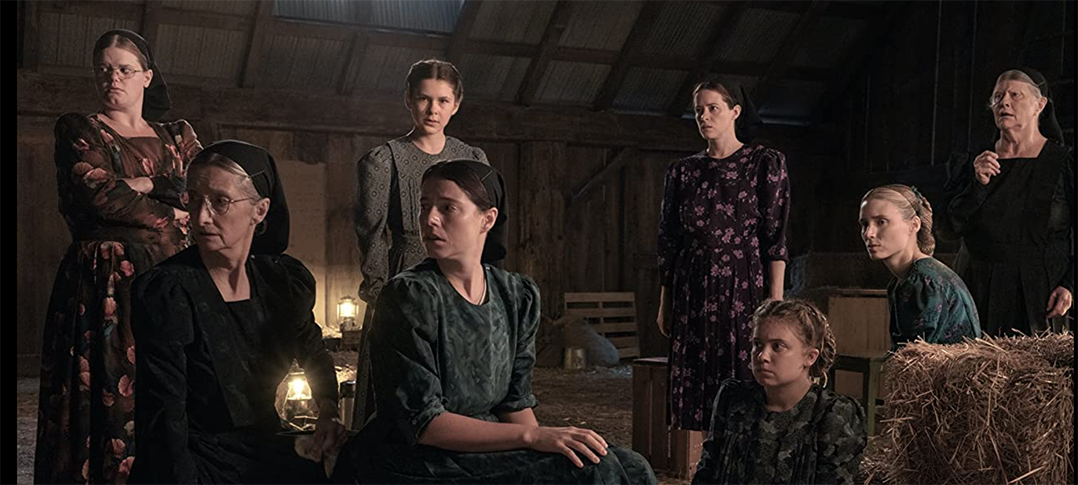Based on an actual Mennonite colony in Bolivia, the Molotschna women gather in the hayloft of a barn to collectively determine their next move. You see, the community’s males have been drugging and raping the women and girls for years. The supremely religious but uneducated and illiterate women assumed their fate was the result of demons. Only recently have they learned the truth. And now they must decide whether to stay in the colony, fight the men, or leave the colony altogether.
And thus begins Sarah Polley’s new film, “Women Talking,” based on Miriam Toews’ 2018 novel of the same name. Toews was raised in a Mennonite community in Canada but left when she turned 18. So, she knows a thing or two about the communal structure, family hierarchy, and the rhythm of daily life. Apparently, the news of the Bolivian colony struck a nerve, and prompted Toews to write “Women Talking.” Polley’s adapted screenplay follows the novel fairly accurately (although it relocates the action to somewhere in North America) and gives a cast of excellent actresses an opportunity to shine in an important and Oscar-worthy production.
Two of the settlement’s three matriarchs spearhead the discussion, although their daughters – all in their child-bearing years – perform most of the meatiest dialogue. The matriarchs are Agata, played by longtime stage actress Judith Ivey, and Greta, played by veteran Canadian actress Sheila McCarthy. The third matriarch, “Scarface” Janz (named after a physical feature presumably suffered during a rape), is played by Frances McDormand. It’s a small role for McDormand, who also served as producer, and was instrumental bringing this story to the big screen.
Agata’s daughters are Ona (Rooney Mara) and Salome (Claire Foy). Greta’s daughters are Mariche (Jessie Buckley) and Mejal (newcomer Michelle McLeod). The family structure is a little confusing at first because Buckley looks like she would be Ivey’s daughter, whereas Mara and McCarthy have similar features and facial structure.
In an inspiring bit of casting, Buckley’s character, Mariche, is the hot-headed victim whose initial preference is to remain in the community and fight the men for superiority, where Rooney’s Ona is the more soothing, level-headed leader. The fact that these actresses play against type is exhilarating. And in a film with little to no action, Polley’s casting choice keeps us on our feet because our expectations are thrown off from the outset.
In another moving directorial selection, Polley never introduces us to any of the men. At first, we believe this might be an Amish community. But since we never lay eyes on the men, we’re unsure. That is, until we meet August, played by Ben Whishaw. August was excommunicated by the colony’s male leaders (for what infraction, we never learn), but has recently been allowed to return. He was educated in England, and now serves as the teacher to all the children of the community. Unlike the others, August can read and write. The women “hire” his services to take the minutes from their meetings. August and Ona have feelings for one another, but fortunately the screenplay keeps the two from acting on their affections.
At first, the idea of a group of women and children (and the 10–12-year-olds are included, as they, too, have been raped) discussing their mutual future within a primitive community isolated from the rest of the world sounds tedious. But their discourse becomes increasingly moving as “Women Talking” progresses. The questions raised cause us to stop and think what we might do in their situation. If the women choose to fight the men, how do they physically overtake them? If the women leave the colony, will they take their boys with them, or leave the boys behind to be corrupted by their male elders? What would be the age cutoff for taking the boys with them? How will the women collectively take everything of importance with them without the men suspecting anything of their plans?
And ever-present in all the deliberation is their standing in the eyes of God. Will God forgive them if they leave their community? On the other hand, will he forgive them if they stay now that they know their fate? It’s rare to see a film in which holy reverence plays a key role and is not treated as a source of comedy or shame. It is refreshing to see the religious angle approached in this sincere and thoughtful manner, even though their view of God most likely does not mirror that of those who will see this film.
To give away any more of the proceedings would be to spoil what ranks as one of this year’s best pictures. In a way, “Women Talking” is to 2022 what Fran Kranz’ “Mass” was to 2021 – a “discussion” film in which almost no action occurs, much is discussed, and (in both cases) brilliance is achieved. “Mass” was the 90-minute discussion between the parents of a boy who was killed in a school shooting and the parents of the boy who fired the weapon. It was a harrowing but encouraging movie, seen by far too few. Although “Women Talking” sports an “A” list cast, my fear is that too few will see this one as well. Again, the premise sounds mundane and grim. But please do yourself a favor and spend a little time with these women. This is a powerful and inspirational film.



